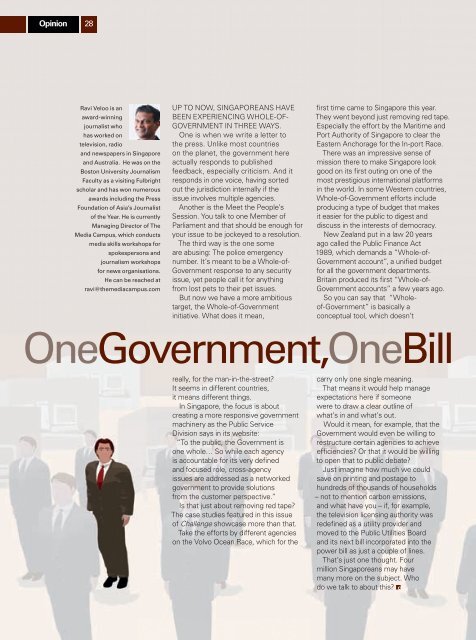PDF (7.80MB) - Challenge Online
PDF (7.80MB) - Challenge Online
PDF (7.80MB) - Challenge Online
Create successful ePaper yourself
Turn your PDF publications into a flip-book with our unique Google optimized e-Paper software.
Opinion 28<br />
Ravi Veloo is an<br />
award-winning<br />
journalist who<br />
has worked on<br />
television, radio<br />
and newspapers in Singapore<br />
and Australia. He was on the<br />
Boston University Journalism<br />
Faculty as a visiting Fulbright<br />
scholar and has won numerous<br />
awards including the Press<br />
Foundation of Asia’s Journalist<br />
of the Year. He is currently<br />
Managing Director of The<br />
Media Campus, which conducts<br />
media skills workshops for<br />
spokespersons and<br />
journalism workshops<br />
for news organisations.<br />
He can be reached at<br />
ravi@themediacampus.com<br />
UP TO NOW, SINGAPOREANS HAVE<br />
BEEN EXPERIENCING WHOLE-OF-<br />
GOVERNMENT IN THREE WAYS.<br />
One is when we write a letter to<br />
the press. Unlike most countries<br />
on the planet, the government here<br />
actually responds to published<br />
feedback, especially criticism. And it<br />
responds in one voice, having sorted<br />
out the jurisdiction internally if the<br />
issue involves multiple agencies.<br />
Another is the Meet the People’s<br />
Session. You talk to one Member of<br />
Parliament and that should be enough for<br />
your issue to be jockeyed to a resolution.<br />
The third way is the one some<br />
are abusing: The police emergency<br />
number. It’s meant to be a Whole-of-<br />
Government response to any security<br />
issue, yet people call it for anything<br />
from lost pets to their pet issues.<br />
But now we have a more ambitious<br />
target, the Whole-of-Government<br />
initiative. What does it mean,<br />
really, for the man-in-the-street?<br />
It seems in different countries,<br />
it means different things.<br />
In Singapore, the focus is about<br />
creating a more responsive government<br />
machinery as the Public Service<br />
Division says in its website:<br />
“To the public, the Government is<br />
one whole… So while each agency<br />
is accountable for its very defi ned<br />
and focused role, cross-agency<br />
issues are addressed as a networked<br />
government to provide solutions<br />
from the customer perspective.”<br />
Is that just about removing red tape?<br />
The case studies featured in this issue<br />
of <strong>Challenge</strong> showcase more than that.<br />
Take the efforts by different agencies<br />
on the Volvo Ocean Race, which for the<br />
fi rst time came to Singapore this year.<br />
They went beyond just removing red tape.<br />
Especially the effort by the Maritime and<br />
Port Authority of Singapore to clear the<br />
Eastern Anchorage for the In-port Race.<br />
There was an impressive sense of<br />
mission there to make Singapore look<br />
good on its fi rst outing on one of the<br />
most prestigious international platforms<br />
in the world. In some Western countries,<br />
Whole-of-Government efforts include<br />
producing a type of budget that makes<br />
it easier for the public to digest and<br />
discuss in the interests of democracy.<br />
New Zealand put in a law 20 years<br />
ago called the Public Finance Act<br />
1989, which demands a “Whole-of-<br />
Government account”, a unifi ed budget<br />
for all the government departments.<br />
Britain produced its fi rst “Whole-of-<br />
Government accounts” a few years ago.<br />
So you can say that “Wholeof-Government”<br />
is basically a<br />
conceptual tool, which doesn’t<br />
OneGovernment,OneBill<br />
carry only one single meaning.<br />
That means it would help manage<br />
expectations here if someone<br />
were to draw a clear outline of<br />
what’s in and what’s out.<br />
Would it mean, for example, that the<br />
Government would even be willing to<br />
restructure certain agencies to achieve<br />
effi ciencies? Or that it would be willing<br />
to open that to public debate?<br />
Just imagine how much we could<br />
save on printing and postage to<br />
hundreds of thousands of households<br />
– not to mention carbon emissions,<br />
and what have you – if, for example,<br />
the television licensing authority was<br />
redefi ned as a utility provider and<br />
moved to the Public Utilities Board<br />
and its next bill incorporated into the<br />
power bill as just a couple of lines.<br />
That’s just one thought. Four<br />
million Singaporeans may have<br />
many more on the subject. Who<br />
do we talk to about this?


